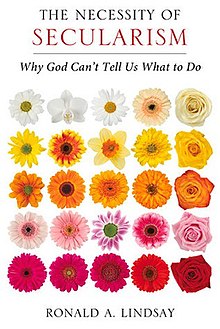Secularism is the principle of seeking to conduct human affairs based on naturalistic considerations, uninvolved with religion.

Secular humanism is a philosophy, belief system, or life stance that embraces human reason, logic, secular ethics, and philosophical naturalism, while specifically rejecting religious dogma, supernaturalism, and superstition as the basis of morality and decision-making.
Irreligion is the absence or rejection of religious beliefs or practices. It encompasses a wide range of viewpoints drawn from various philosophical and intellectual perspectives, including atheism, agnosticism, skepticism, rationalism, and secularism. These perspectives can vary, with individuals who identify as irreligious holding a diverse array of specific beliefs about religion or its role in their lives.
Secularity, also the secular or secularness, is the state of being unrelated or neutral in regards to religion. Origins of secularity can be traced to the Bible itself and fleshed out through Christian history into the modern era. In the medieval period there were even secular clergy. Furthermore, secular and religious entities were not separated in the medieval period, but coexisted and interacted naturally. The word "secular" has a meaning very similar to profane as used in a religious context.
Nontheism or non-theism is a range of both religious and non-religious attitudes characterized by the absence of espoused belief in the existence of God or gods. Nontheism has generally been used to describe apathy or silence towards the subject of gods and differs from atheism, or active disbelief in any gods. It has been used as an umbrella term for summarizing various distinct and even mutually exclusive positions, such as agnosticism, ignosticism, ietsism, skepticism, pantheism, pandeism, transtheism, atheism, and apatheism. It is in use in the fields of Christian apologetics and general liberal theology.
Internet Infidels, Inc. is a Colorado Springs, Colorado-based nonprofit educational organization founded in 1995 by Jeffery Jay Lowder and Brett Lemoine. Its mission is to use the Internet to promote a view that supernatural forces or entities do not exist. Internet Infidels maintains a website of educational resources about agnosticism, atheism, freethought, humanism, secularism, and other nontheistic viewpoints particularly relevant to nonbelievers and skeptics of the paranormal. Relevant resources include rebuttals to arguments made by religious apologists and theistic philosophers, transcripts of debates between believers and nonbelievers, and responses from opponents of a naturalistic worldview. The site has been referred to by one of its critics, Christian apologist Gary Habermas, as "one of the Internet's main Web sites for skeptics", and by skeptical physicist Taner Edis as "a major Web site serving nonbelievers". Its tagline is "a drop of reason in a pool of confusion".
Jewish atheism refers to the atheism of people who are ethnically and culturally Jewish. Contrary to popular belief, the term "Jewish atheism" is not a contradiction because Jewish identity encompasses not only religious components, but also ethnic and cultural ones. Jewish law's emphasis on descent through the mother means that even religiously conservative Orthodox Jewish authorities would accept an atheist born to a Jewish mother as fully Jewish.

The Center for Inquiry (CFI) is a U.S. nonprofit organization that works to mitigate belief in pseudoscience and the paranormal and to fight the influence of religion in government.
Secular ethics is a branch of moral philosophy in which ethics is based solely on human faculties such as logic, empathy, reason or moral intuition, and not derived from belief in supernatural revelation or guidance—a source of ethics in many religions. Secular ethics refers to any ethical system that does not draw on the supernatural, and includes humanism, secularism and freethinking. A classical example of literature on secular ethics is the Kural text, authored by the ancient Indian philosopher Valluvar.
Criticism of atheism is criticism of the concepts, validity, or impact of atheism, including associated political and social implications. Criticisms include positions based on the history of science, philosophical and logical criticisms, findings in both the natural and social sciences, theistic apologetic arguments, arguments pertaining to ethics and morality, the effects of atheism on the individual, or the assumptions that underpin atheism.

Humanism is a philosophical stance that emphasizes the individual and social potential, and agency of human beings, whom it considers the starting point for serious moral and philosophical inquiry.

The Richard Dawkins Foundation for Reason and Science is a division of Center for Inquiry (CFI) founded by British biologist Richard Dawkins in 2006 to promote scientific literacy and secularism.

The Language of God: A Scientist Presents Evidence for Belief is a bestselling book by Francis Collins in which he advocates theistic evolution. Collins is an American physician-geneticist, noted for his discoveries of disease genes, and his leadership of the Human Genome Project (HGP). He served as the director of the US National Institutes of Health from August 17, 2009 to December 19, 2021. In the book, Collins describes briefly how he became a Christian.

The Institute for the Study of Secularism in Society and Culture (ISSSC) is located at Trinity College in Hartford, Connecticut. ISSSC was established in 2005 to advance the understanding of the role of secular values and the process of secularization in contemporary society and culture. Designed to be multidisciplinary and nonpartisan, the Institute conducts research, lectures and public events.
Secular morality is the aspect of philosophy that deals with morality outside of religious traditions. Modern examples include humanism, freethinking, and most versions of consequentialism. Additional philosophies with ancient roots include those such as skepticism and virtue ethics. Greg M. Epstein also states that, "much of ancient Far Eastern thought is deeply concerned with human goodness without placing much if any stock in the importance of gods or spirits." An example is the Kural text of Valluvar, an ancient Indian theistic poet-philosopher whose work remains secular and non-denominational. Other philosophers have proposed various ideas about how to determine right and wrong actions. An example is Immanuel Kant's categorical imperative.
Articles related to philosophy of religion include:
Iain Tyrrell Benson is a legal philosopher and practising legal consultant. The main focus of his work in relation to law and society has been to examine some of the various meanings that underlie terms of common but confused usage. His work towards an understanding of secular and secularism has been cited by the Supreme Court of Canada and the Constitutional Court of South Africa. He has also given critical study to the terms pluralism, faith, believer, unbeliever, liberalism and accommodation and examined the implications for various legal and non-legal usages.
Austin Dacey is an American philosopher, writer, and human rights activist whose work concerns secularism, religion, freedom of expression, and freedom of conscience. He is the author of The Secular Conscience: Why Belief Belongs in Public Life, The Future of Blasphemy: Speaking of the Sacred in an Age of Human Rights, and a 2006 New York Times op-ed entitled "Believing in Doubt," which criticized the ethical views of Pope Benedict. He is a representative to the United Nations for the International Humanist and Ethical Union and the creator and director of The Impossible Music Sessions.

Ronald A. Lindsay was president and CEO of the Center for Inquiry and of its affiliates, the Council for Secular Humanism and the Committee for Skeptical Inquiry. He held this position June 2008 – 2016.
Philip Joseph Zuckerman is a sociologist and professor of sociology and secular studies at Pitzer College in Claremont, California. He specializes in the sociology of substantial secularity and is the author of eight books, including Beyond Doubt: The Secularization of Society (2023) What It Means to Be Moral: Why Religion Is Not Necessary for Living an Ethical Life (2019).







